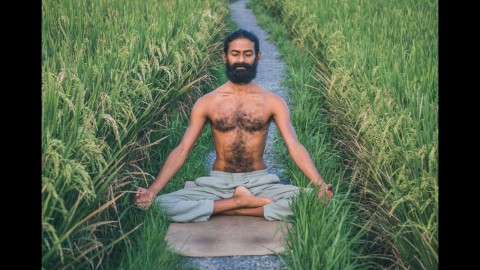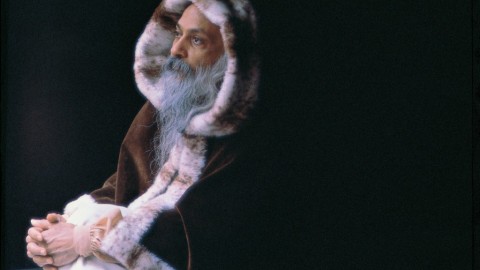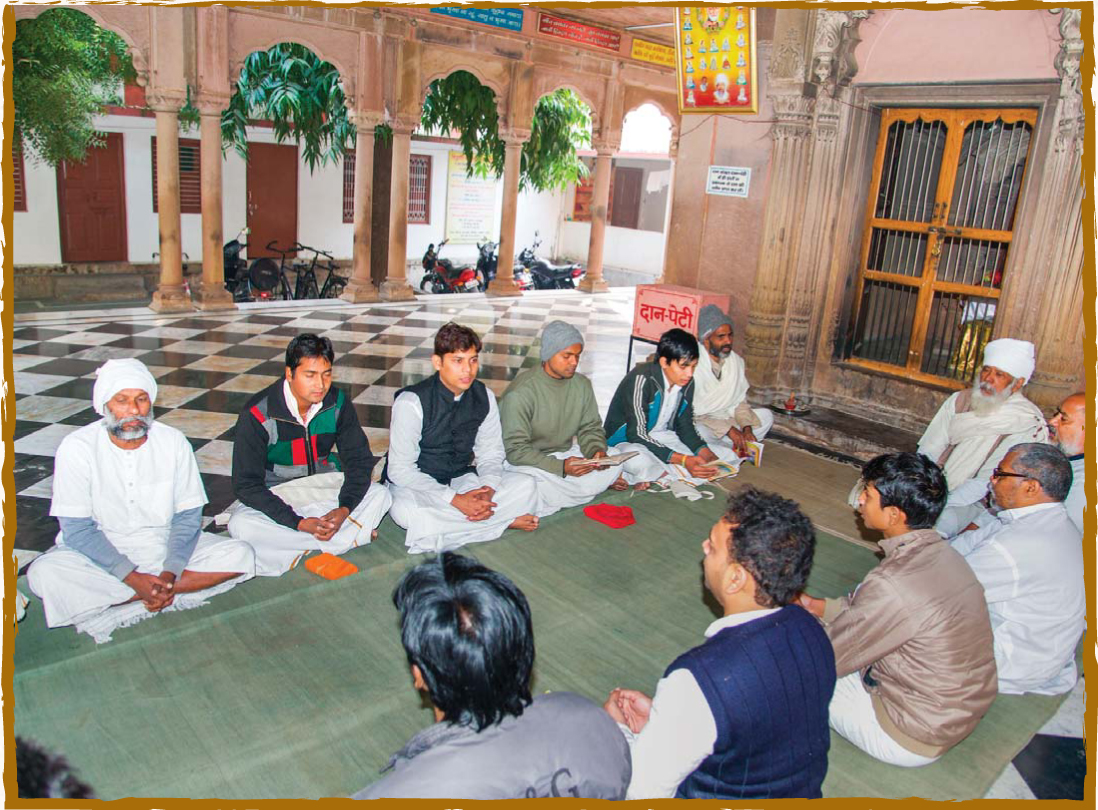Questions to Osho – WHY DO YOU EMPHASIZE THAT ONE SHOULD JUMP DIRECTLY INTO THE SEVENTH STEP, THAT IS DHYAN, AND THEN FINISH THE OTHER STEPS SO AS TO BE TOTAL TO REALIZE SAMADHI?
Osho’s answer – For a specific reason. I insist first to jump into dhyan, into meditation, and then complete all the other steps because you have lost the taste of dhyan, of meditation, so completely that unless you regain the taste you will not take the trouble of fulfilling all other things.
In Patanjali’s time meditation was an accepted fact. Everybody was meditating.
Every child was to be sent to gurukul, into a forest monastery. There the basic teaching was of meditation; everything else was secondary. When he is twenty-five he will come back to society, but he has learned meditativeness. He will live in the marketplace, but live meditatively. By the age of fifty, he is again ready to go back to the forest. And by the age of seventy-five he will not do anything else other than meditation.
So if you just look at the whole span of life, if it is a hundred years: in the first twenty-five years, in the beginning, the taste of meditation has been given – one knows the flavor of it, the fragrance of it. One knows the beauty of it, the benediction of it – and then one comes into the world. Now, one will never be part of the world; one knows something beautiful exists there in the forest. One has known aloneness; now being together in a crowd, in a world, one will never be at home. One has tasted… now all other tastes are not of any worth. One will be in the world as a duty.
That’s what Hindu scriptures say, that one has to be in the world as a duty. Your parents reproduced you: you have to fulfill your duty and reproduce others so that the society and the chain continues and the river goes on flowing – you should not block the river. But the call goes on coming. The man works in the shop, lives in the market, raises children, gets married, a thousand and one things he does, but the call goes on coming. In certain moments, in the morning when the market is silent and the world is still asleep – he gets up… he takes a dip in that meditation he has been allowed to know in his first twenty-five years.
In the night, when everybody has gone to sleep, he sits in his bed… the call goes on following him like a shadow.
By the age of fifty, he has to move again because now his children are almost twenty-five; they are coming back from the forest. Now they will take care of the world; now his duty is fulfilled. But at the age of fifty he does not go to the forest, actually. The Sanskrit word is vanprastha: he turns his face towards the forest.
He does not leave the house, because for a few years he will be needed for the children who are coming back, to give them his own experience of life, to let them settle. Otherwise this will be a very unsettling phenomenon – they come home and he goes, then there will be no link with the world. They have learned something about existence; now they have to learn something of the world from the father.
But now the father will be secondary; the children will become the primary forces. The father will step back, the mother will step back… the daughter-in-law comes, the son comes. Now they become the real householders, and father and mother are there just if they need some advice. The advice can be given, but now their faces are towards the forest; they are getting ready.
When they are seventy-five, their children will be almost fifty. Now the mother and father are getting ready to turn towards the forest – they leave, they go to the forest again.
The Indian life started in the forest, then ended in the forest; started in loneliness, ended in aloneness; started with meditation, ended with meditation. In fact – seventy-five years for meditation, only twenty-five years for the world: the world cannot be too much… the inner current continues. In fact the whole life was meditative – only for twenty-five years did one take something as a duty to be done.
In those days there was no need to give you a taste of meditation, you had already known it, but now things are totally different. You don’t know what meditation is. When I say, “meditation,” just a word rings in your ears – there is no response. If I say “lemon” the saliva starts flowing in your mouth, but when I say, “meditation,” nothing corresponds. When I say, “God” the mouth remains dry.
You have not tasted; the word is meaningless.
Hence, I say first meditate. That is, just take a little taste, just have a little glimpse. Then you will start on your own, and then you will start fulfilling other steps. You need a glimpse, it was not needed before; hence my emphasis on meditation directly. Once you are meditative everything will follow. I need not talk about it; you will start doing it by yourself.
When you are meditative, you would like to sit silent and still: asan will follow.
When you are meditative, you will come to the understanding that breathing has a rhythm of silence: pranayam will follow. When you are silent, meditative, enjoying aloneness, your character will change; you will not interfere in anybody’s life: you will be nonviolent. You will be true because whenever you will be untrue your inner balance will be lost. By being untrue you may save five rupees, but by being untrue you will lose so much – inside, a new wealth now you have to lose. I have never seen such a person who would be so foolish – that just for five rupees he would lose the inner treasure, which is more valuable, infinitely valuable. Then yam follows. When you become more and more silent, life becomes spontaneous: niyam, an inner discipline, comes automatically. Just a little help from you, and understanding, and things start falling in line. But the first thing is to know what meditation is; everything else follows.
Jesus said, “Seek ye the kingdom of God first, then all else shall follow.” The same I say to you.
OBVIOUSLY, I HAVE DODGED ALL THE PAST BUDDHAS THAT I CAME ACROSS, BUT I NOW KNOW THAT AS LONG AS I AM IN THIS BODY I AM NOT GOING TO LEAVE THIS ONE. BUT, THEN, A LURKING FEAR REMAINS LEST I LEAVE, OR YOU LEAVE, THE BODY BEFORE NONPHYSICAL COMMUNION IS ESTABLISHED.
That fear is natural, and, in a way, good. Nothing to be afraid of in it; that fear will help. All fears are not bad, and all fearlessnesses are not good. Sometimes fearlessness is simply foolishness; sometimes fear is wisdom. This fear I call wisdom, because you know this is possible. You have been missing many Buddhas in the past – more possibility is there that you will miss me also, because you have become so trained in missing. The fear is good. That will help.
The fear is wise; that will not allow you to relax and become unaware – that will not allow you to miss again.
Be thankful to the fear, and always remember, fear is not always bad. When you find a snake on the path, what do you do? You simply jump. Are you afraid? Are you a coward? Some idiot can tell you that you are a coward, but what do you think?… What will Buddha do? He will jump faster than you, that’s all. Because he is more alert he will see the snake before you can see; he will see the danger before you can see. You may take a little time because you are so deeply asleep.
A Buddha will jump faster, that’s all. But is a Buddha afraid of the snake? No, the question is not of being afraid or not. He is simply alert, and out of alertness he acts.
This fear is a sort of alertness. Don’t call it “a lurking fear”; rather, call it “an arising alertness,” because the way you call a Thing makes much difference. If you call it “fear” you have already condemned it. If you call it “an arising consciousness” you have already accepted it, appreciated it.
And if you are alert, this time you will not miss. The whole thing is alertness. If you are aware, you will not miss. You missed in the past because you were in a deep sleep, in a hypnotic state. Your eyes were closed. You missed because you couldn’t understand that there was a Buddha. Once you understand that there is a Buddha. How can you miss? Once you know that this is a diamond, you cannot throw it. You may have thrown other diamonds thinking that they are just pebbles….
I have heard a Sufi story. It happened: A fakir. a poor beggar, was passing along the shore of a small lake. He stumbled upon a bag. It was early in the morning.
The sun had not risen; it was still dark. He opened the bag, felt what was inside; there were just stones. Sitting on the shore of the lake, not having anything to do, he started throwing those stones in the lake. They splashed, they created ripples… he enjoyed. Then, by and by, the morning came nearer and nearer, darkness disappeared. By the time it was light enough to see what he was doing, the last stone was left. It was a diamond. He started crying and weeping. They were all diamonds. But now he cannot throw it.
You may have thrown the whole bag of stones and Buddhas. This time if a small alertness has come to you and the light has dawned. How can you throw it? It is impossible.
Tags: Fear Is Wise Patanjali










